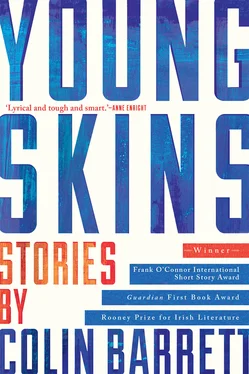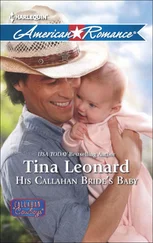‘Did you?’ Doran said. ‘Go up?’
‘I had a wander,’ Eli admitted, low-voiced. ‘The cemetery first. To see where they were putting her. It’s on a hill.’
‘Maryanne,’ Doran said.
Eli gave a small shake of his head. The shake was not demonstrative; it was to himself. ‘Maryanne,’ he said. ‘When did you hear?’
‘A couple of days back,’ Doran said. He looked at Eli. ‘I’m sorry,’ he said, with a formal wince of his brow.
‘Me too,’ Eli said.
‘How’s Laura?’ Doran asked.
‘She’s good.’
‘She know you’re here?’
Eli shrugged.
‘And the baba?’
‘I refrained from sharing my plans with the three- year-old,’ Eli said. ‘You got any creature on the scene yourself?’
Doran grinned. ‘Those days are done, I’m almost sure.’ He splayed a hand on the counter and inspected the digits, as if in a moment of recent inattention a ring might have somehow contrived to snag itself there. ‘No,’ he continued, ‘I’ve entered the era of grand onanistic solitude, and, to be honest, that’s fucking fine by me.’
‘I doubt that,’ Eli said.
‘Well,’ Doran said, raising his brows and trailing diplomatically into silence.
Doran’s eyes went again to the clock. Eleven minutes past eleven. The burial would follow at noon. He himself had arrived at the Tavern just after nine, empty-stomached but full of cringingly honourable intentions. His plan had been to bolster his courage with a quantity of preliminary drinks before heading to the funeral. But the drink had not coaxed forth that kind of courage (as he knew, in his bones, it would not), and so Doran had sat, and not moved, and eleven had come and gone, and he had kept drinking in order to tolerate his ingrained cowardice. Cowards were cowards, Doran considered ruefully, but they required conviction to be so — the brave thing was usually the easier thing.
Doran took a long draught of his pint and smacked his lips with satisfaction.
‘Mortality’s a skull-fuck, isn’t it?’ he said.
‘Hm,’ Eli grunted.
‘She wasn’t well,’ Doran said, ‘is what I heard.’
‘Me too,’ Eli said.
‘Did we always know she was not well?’
Eli considered the skulls on Doran’s tie, the repeating rows of black eyes.
‘I don’t know. You think on it, you turn things over. But the memories come out of your notions of them, what you thought was happening. And Christ knows we all had our dramatic days, back then. But if you’re asking if I ever thought she’d do this. .’
‘It would never have occurred to me to ask,’ Doran interjected, looking down into the sudsy, popping surface of his pint. ‘Was it done violently, I wonder? Was there grisly theatre involved? A messy aftermath.’
‘Christ, it hardly matters now,’ Eli said.
‘Or painlessly, hygienically,’ Doran went on. ‘There was a guy back in the day, and when I say day, I mean the forties. A writer. He done himself in and had to leave a note of course, had to attempt a pithy little addendum. “I am going to put myself to sleep for a bit longer than usual. Call it eternity,” is how he signed off this planet.’
‘You want to control it,’ Eli said.
‘Fuck her,’ Doran said. ‘Fuck her for what she did. And we’re not even getting the worst of it, are we? We’re the old guard. We’re from the old way-back days. We’ve already had to get over her, haven’t we?’
‘Fuck her,’ Eli repeated softly, experimentally. He turned composedly to the bar. He kneaded the bridge of his nose, the sockets of his eyes.
‘Sorry,’ Doran said.
‘Why? You’re just Doran being Doran,’ Eli explained.
‘ Sorry ,’ Doran said again, ‘you know my cuntishness is as congenital as my cravenness. The only cure is no me.’ Doran extended a beefy palm, patted Eli’s shoulder. ‘But I was always glad you and her got together, you know.’
Eli chortled. ‘Now that was a bad idea.’
‘It was a fucking terrible idea,’ Doran grinned. ‘But what wasn’t, back then? After I quit I spent a season licking the windows in the mother’s house in Portlaoise, for instance. You two tried, anyhow.’
‘The marriage was insanity.’
‘The glory days,’ Doran said wistfully. ‘You say we had our moments but not you. You were a good boy for so long. Sensible, abstemious. You were, Eli, sorry, that sounds like an insult but it’s not. Only she could turn you out of your equilibrium. She had a knack for it.’
‘Not that she meant it, I don’t think,’ Eli mused. ‘But she did make you want to lie down in the middle of traffic, alright.’
‘Was that how it felt?’ Doran asked.
‘That’s what it feels like it felt like,’ Eli said. ‘But I don’t know. I don’t know how it was for her. At all.’
Eli took a sip of his beer, Doran a deep quaff. The barman showed no sign of resurfacing; the clock ticked on. Eventually Doran gave a gentle, annunciatory clearing of his throat.
‘She was our girl, a singer in our band, is what she was,’ he said. He raised his glass and kept it aloft until Eli chinked it.
Eli could not deny that, at least. Sunken Figure was the band Eli, Doran, and a third friend, Proinsias Stanton, had founded in college, twenty years ago. Doran had been the original frontman and lyricist, ransacking undergrad poetry anthologies to flesh out the pornographic gibberish he half barked, half crooned. Eli wrote the actual music — clean post-punk lines and agitated percussion — and played bass. Stanton was lead guitar and for a time attempted to manage the band. Maryanne Watt first materialised on Stanton’s arm, a serious girlfriend, in the long post-college epoch Sunken Figure spent toiling upon the capital’s circuit. Stanton himself soon gave up, quitting the band for a job in the national forestry. Maryanne quit him and stuck with the band. Eli convinced Doran to let her on stage. And she did look good, rattling a tambourine and occasionally contributing tremulous backing vocals. Other members — drummers and auxiliary guitarists and keyboardists — came and went and Sunken Figure laboured amiably on, eking out enough of an existence to continually defer extinction, until the turn of the millennium, when something like actual success occurred. There was, finally, a major label deal, a hit single. There was coverage, attention, even money. And then came the grand folly: a marathon triple-figure-date tour that ate up thirteen months of their lives and killed Sunken Figure stone dead.
The trouble started with the single. For the major’s album, Ley Lines , Maryanne had sung lead on only one song, a B-side that was shifted up onto the official tracklisting at the last minute, but that song was the hit. Every interview and public appearance thereafter was an exercise in clarification. What the world wanted was more folk-pop gems smoulderingly essayed by the willowy brunette — instead it got more Doran, howling and spitting on his haunches over lengthy, bristling compositions. The classic soap-operatics kicked belatedly in: at some ill-advised point Doran and Maryanne began sleeping together. The tour just would not stop. As things soured Maryanne migrated from Doran’s bed to Eli’s. Eli had been sadly, silently in love with her since the time he had first laid eyes on her, and he gravely capitulated to what could only be a bad idea. Neither were the affairs successive, but concurrent. In the panoptic confinement of tour life Maryanne alternated nights with Doran and Eli. Doran, surprisingly, was the one to quit first. With a month left on the tour, he stole away on a dawn flight from a frostbitten airport in Helsinki, made for the rural midlands town he had sprung from and summarily deposited himself into the care of his mother, to embrace what he would thereafter denominate his Brian Wilson period — a six-month interval of flannel-pyjama’d reclusiveness, weight gain, around-the-clock dope-smoking and twilight bouts of compulsive weeping in the backyard greenhouse, the mildewed cord of his bathrobe stuffed into his mouth to stymie the worst of his guttural heaves.
Читать дальше












